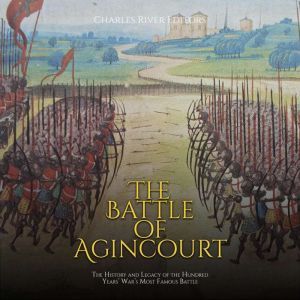
List: $6.95
| Sale: $4.87
Club: $3.47
The Battle of Agincourt: The History and Legacy of the Hundred Years' War's Most Famous Battle
Author: Charles River Editors
Narrator: Colin Fluxman
Unabridged: 1 hr 53 min
Format: Digital Audiobook Download
Publisher: Charles River Editors
Published: 12/31/2021
Category: History - Europe - Great Britain
Synopsis
Although it ended over 550 years ago, the Hundred Years’ War still looms large in the historical consciousness of England and France, even if the name of the famous war is a misnomer. Actually a series of separate conflicts between the English and French monarchies, interspersed with periods of peace, its historical image is an odd one, in part because its origins were based on royal claims that dated back centuries and the English and French remained adversaries for nearly 400 years after it ended. That said, the war was transformative in many respects, and the impact it had on the geopolitical situation of Europe cannot be overstated. While some might think of the war as being a continuation of the feudal tradition of knights and peasants, the Hundred Years’ War revolutionized Western European warfare, and it truly helped to usher in the concept of nationalism on the continent. In England, it is remembered as a period of grandeur and success, even though the English lost the war and huge swathes of territory with it, while the French remember it as a strategic victory that ensured the continued independence of France and the denial of English hegemony. The legacy of the war has lived on ever since, helping determine how England became politically severed from the continent, how the knightly chivalric tradition slid into irrelevance, and how battlefield dominance can still leave a nation a loser in war. The mythology of the humble but determined English infantry was born out of the mud of Agincourt and the success of English peasant longbowmen against the ostentatiously upper-class French men-at-arms. Today, when the English think of the war, they are more likely to ignore the burning cottages and the payment of ransoms and instead remember the brave words put into Henry V's mouth centuries later by Shakespeare: “Once more unto the breach, dear friends, once more.”